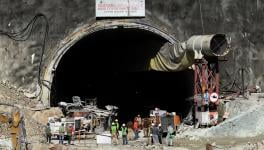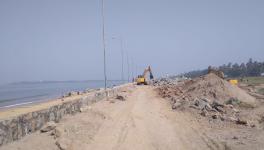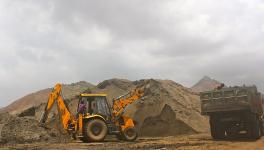TSR Committee Report-An Assault on the Environment in Favour of Big Business
NewsClick interviewed D. Raghunandan, President of All India Peoples Science Network, on TSR Subramanian Committee report. According to Raghunandan, the report is an attempt to dismantle the existing legislative provisions and weaken the environmental protection mechanisms. The report also suggests the removal of judicial review of environmental clearances in order to help big business. This report is an attempt to extend to entire India the Gujarat model, in which environmental pollution control measures were completely jettisoned. This abandoning of all pollution control measures is what has made Vapi, an industrial town in Gujarat, the most critically polluted area in the country.
Prabir Purkayastha(PP): hello and welcome to NewsClick. Today we are discussing the TSR Subrmanium committee report on the environment and what changes are sought to be made by the new government. We have with us D. Raghunandan of Delhi Science Forum and president of All India Peoples Science Network who has been working on environmental issues for decades. Raghu good to have you with us.
PP: what is the objective of the TSR Subramanium Committee Report? Why it was set up and what are its broad directives?
D. Raghunandan(DR): ostensibly the committee was set up to review existing environmental legislations, the government being of the view that these have become cumbersome, that they are standing in the way of smooth implementation of developmental programs and that they have lacked transparency in their implementation; this is the ostensible reason. However from the results of what we have seen from the committee’s report, it seems to me to be an attempt to dismantle the existing environmental legislation and to create a structure to enable smooth passage of environmental clearances to new industries with the idea of having quick setting up of new projects without the hurdles imposed by environmental regulations and to allow smooth passage for new projects and to allow smooth functioning of earlier projects without unnecessary hindrance from environmental regulation.
PP: Raghu, nobody wants unnecessary hindrance, nobody opposes smooth passage of things if everything is okay. So what is the whole dupe and what use to be the whole dupe and what does it really imply there?
DR: two things I think stand out, one is there were delays in evaluation of projects, there were problems in the way in which projects were evaluated. We all know the experience with Environment Impact Assessments has been far from satisfactory with private consultants playing duck and drakes with EIA reports. We know, these problems earlier existed and I would have been very happy to see a comprehensive review of these processes and the setting up of new systems with capability to do evaluation of new projects, quick environment impact assessments and then assessing these in order to grant or not grant environmental clearances. What this report does however is, to say, because our systems have not worked earlier, in the future let’s not have systems at all. Everything has gone with that and what the TSR committee has recommended essentially is to do away with these various cumbersome laws, either in terms of the laws themselves by clubbing them in with an umbrella legislation which would then make things easier and to pass the BUCK to state governments. Now again in theory this should be alright, the state government should have the prerogative to make an assessment and then to permit or not permit and regulate industries in their jurisdiction areas. The problem has been that central agencies including the Ministry of Environment and Forests, The Central Pollution Control Board and the State Control Boards have had no capability; either to do assessments or to do monitoring of industries. Idea should have been to strengthen the capacities of these agencies to do the job they were assigned to do.
PP: Raghu if you remember, Bhopal Gas Disaster was a basis for lot of strengthening of the Environment Impact Assessment, rules and so on. Isn’t it somewhat ironical that 30 years after the Bhopal disaster the biggest industrial disaster we are thinking of doing what really came as consequence of that.
DR: The Environment Protection Act itself was set up as a direct consequence of the Bhopal Gas Disaster and set up precisely in order to regulate hazardous industries, other industries to set in motion a process of evaluation, assessment and monitoring. We all know that the weakest link in this was the monitoring of projects which we know is an endemic problem in India anyway. We are good at passing law and then take no measures to enforce their implementation or to monitor them and this is happening sector after sector and the environment is no exception but I think the TSR committee’s biggest disservice has been that having been setup to review the legislations and having been given the great time of two months to review all legislations and then come out with a comprehensive review just took an additional one month and in three months of time have come up with this report which funnily enough contains no review at all. I think the methodology has been exactly what you have suggested is you knew what you wanted to do which is you wanted a loose framework in which industries or project holders would call the shots, there would be no “unnecessary interference” with their work, no hurdles put on them and they could go about merrily doing whatever they wanted. To me clearly the set of recommendations that have come out from here will precisely mean that.
PP: So protection of the environment is no longer the part of the government’s agenda except to a lip service to it is the substantive part to what you are saying. You haven’t talked about the composition of the people who were doing this. Did it contain any environmental experts known for their knowledge of the environmental act etc.
DR: I may be prejudiced but I will have to say no. in the sense that one has seen in the last two decades, the large no.of experts in environment and industry, it’s not just environmentalists or tree huggers as they are called but people who do look at both environment and development. One doesn’t see in this committee any of these people. You have got former secretaries of the government and acting as a secretary to this committee is the secretary of the Gujarat State Pollution Control Board who has actually virtually presided over the dismantling of all environmental monitoring, permission and regulation in the state of Gujarat. The industrial belt around Vapi is today notorious for being one of the most polluted areas of this country where industries are happily charging liquid effluents; these are mostly chemical industries, since we are talking about it in the context of Bhopal who are discharging all kinds of noxious fuels through their chimneys.
PP: last question that what would this mean, would it be change of laws, would the parliament would also be taken into confidence on this or is this only executive action which is envisaged?
DR: it will definitely mean legislative action because this will mean major changes in five major environmental laws; the environment pollution act, the water act, the air act, the environmental protection act and it also involves one of the key recommendations of committee is the reduction of the power of the National Green Tribunal and it has specifically now said that decisions taken by district level environment courts, which are going to be setup, are not subject to reviews by judicial bodies except on matters of procedure and not on the merits of the case which is precisely what the National Green Tribunal was setup for because if it’s just a review on procedural matters the high court is already there to deal with it and could have dealt with it in any case. So now it will mean that decisions taken at lower levels cannot be subject to judicial review. So not only you have done away with good legislation to protect the environment, you have weakened the enforcement and monitoring mechanisms, you have also done away with judicial review.
PP: because this has been the demand of big business and particularly global as well as Indian big business and therefore this possibility of alliance, as it were between big business and local and regional government and the central government RARELY exists and congress is on unknown quantity on this because even the Manmohan government there were a lot of opinion that this is holding up development etc. so we need to see what people really say on this, on the 30th year of the Bhopal disaster, whether we still have memories of what led to it and what we need to protect if we don’t want more Bhopals.
Thankyou very much Raghu. Good to have you with us. We will monitor what happens to this very sensitive area in the future. Thankyou
Get the latest reports & analysis with people's perspective on Protests, movements & deep analytical videos, discussions of the current affairs in your Telegram app. Subscribe to NewsClick's Telegram channel & get Real-Time updates on stories, as they get published on our website.
























